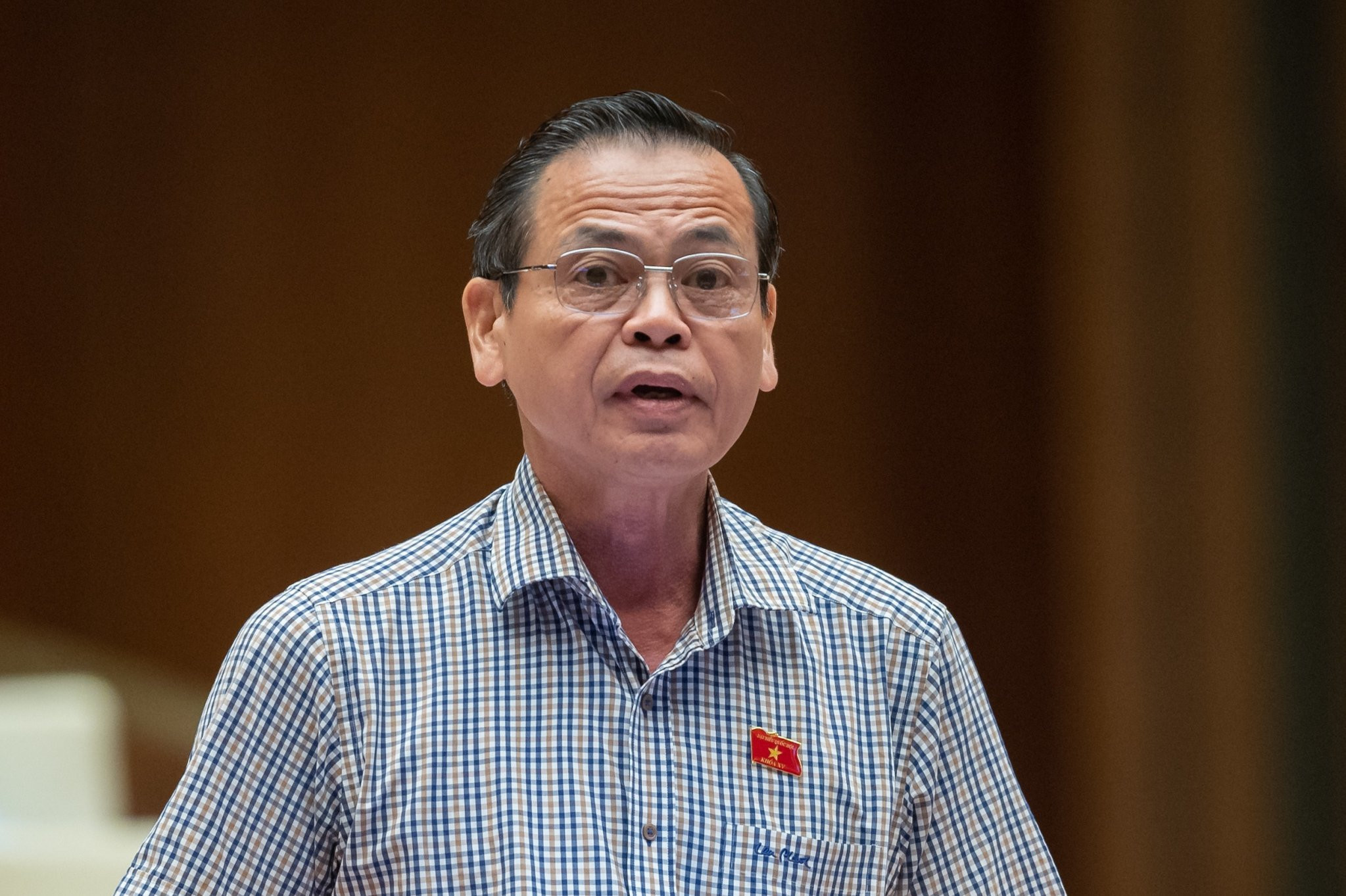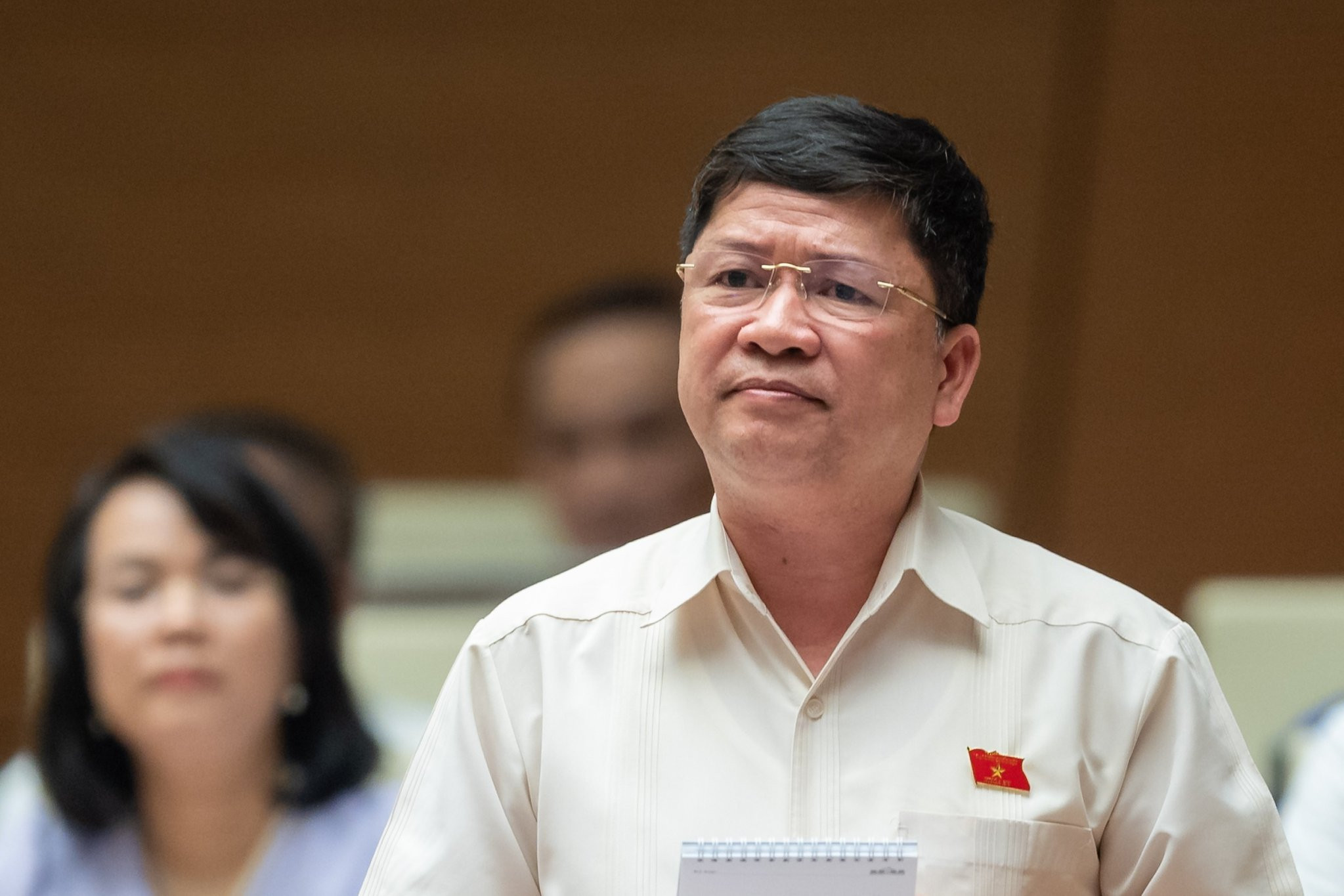How many civil servants 'go to work with an umbrella in the morning and come home with an umbrella in the evening'?
National Assembly delegates suggested summarizing how many leaders have been disciplined, how many people have stood aside when they could not do their jobs; and reviewing how many civil servants 'go to work with an umbrella in the morning and come home with an umbrella in the evening'.
On the morning of May 31, the story of officials avoiding, pushing away, being afraid of responsibility, and not daring to do things became the focus of the parliament, attracting the participation of many National Assembly delegates in the discussion session on the socio-economic situation.
The legal corridor is clear, there is nothing to fear.
Debating this situation, delegate Tran Huu Hau (Tay Ninh delegation) acknowledged that it is true that there are groups of officials and civil servants who are afraid of making mistakes and shirk their work.
However, the delegate noted that if in the performance of public duties, to perform their duties and tasks well, there are clear and appropriate regulations and legal corridors, then certainly, they will only have to make efforts to be proactive and creative in finding more effective ways of doing things, "there is nothing to fear".
 |
Delegate Tran Huu Hau. |
However, in reality today, in many big and small matters, if we decide to do it to meet practical requirements, we may have to violate more or less.
“Those who see violations of regulations and laws “for the common good” but are not afraid are probably “deaf to guns” or lack a sense of organizational discipline,” said a delegate from Tay Ninh province.
Therefore, Mr. Hau worries that "protecting people who dare to think and dare to do" seems "impossible". Because, in some cases, it turns out to be protecting jobs that are not in accordance with regulations.
"And going up the ladder, it may have to go all the way to the National Assembly because the obstacle for them to dare to think and dare to act lies in the incompatibility and contradiction of current laws," the delegate analyzed.
And because of that, it is becoming common for subordinates to ask for opinions, wait for instructions from superiors, and even be assigned clear tasks, but the deeper they go into implementing them, the more stuck they become, so they pass them back to superiors to decide, and only do it after the superiors give their opinions.
From this analysis, the Tay Ninh province delegate looked back at the construction to promulgate the Decree on encouraging and protecting people who dare to think and dare to do, which seems to be almost the same.
The delegates cited a series of regulations from Conclusion 14 of the Politburo on the policy of encouraging and protecting dynamic and creative cadres for the common good to Resolution 28, the 6th Central Conference requiring the institutionalization of this policy. Then the National Assembly's resolution, the Prime Minister's direction related to this content...
The direction, delegates said, is very clear, however, after 3 times of editing the draft and collecting opinions, the Ministry of Home Affairs found that "it is entangled in many legal regulations" so "it is consulting and reporting to the National Assembly Standing Committee to have a pilot resolution on encouraging the protection of officials who dare to think and dare to do. After that, the Prime Minister will issue a decree".
From that reality, delegate Tran Huu Hau put forward the view that "it is necessary to find a way for cadres, civil servants, and public employees at all levels not to dare to think and dare to do; and there is no need for superiors to encourage and protect those who dare to think and dare to do".
Cadres, civil servants and public employees at all levels only need to focus their efforts and intelligence to be "active and creative" in performing their work most effectively for the people and the country within the framework of Party regulations and State laws.
That is, when discovering inappropriate laws or regulations, focus on correcting them immediately with a strict but simple and concise process.
Because, according to the draft of the Ministry of Home Affairs, those who dare to think and act must submit their proposals and must be approved by the competent authority. The most difficult and complicated thing is the law and the final competent authority will be the National Assembly, the National Assembly Standing Committee. Thus, the story will return to the National Assembly for piloting or amending the law.
“I deeply understand the Prime Minister’s words in response to one of my questions: The law is ours; in practice, if we are stuck, and the problem is ours, then we will fix it. However, fixing unreasonable regulations that we ourselves have set up is too difficult,” said a delegate from Tay Ninh.
Delegates are concerned that in many cases, when all or most of the individuals, agencies and units involved are correct and try their best to perform their functions, powers and responsibilities, urgent matters of the people and the country are frozen.
Expressing his inability to accept such phenomena, delegate Tran Huu Hau emphasized: “Right with right must bring about openness, must help the country develop, and meet the people's expectations; right with right cannot lead to stagnation, to impoverishing the country.”
From there, he hopes that the National Assembly will consider to have more appropriate ways of doing things and procedures to promptly resolve arising problems; so that officials do not have to "dare to think and dare to do", focus their strength and intelligence to be proactive and creative in performing their duties and tasks better within the transparency of regulations and laws.
Check to see how many civil servants "go to work with an umbrella in the morning and come home with an umbrella in the evening"
Participating in the debate on this issue, Deputy To Van Tam (Kon Tum delegation) said that currently, there are a number of cadres who, due to limited capacity, do not dare to do the work, so they avoid and push the work away. This phenomenon is often said by our people as "going to work with an umbrella in the morning and returning with an umbrella in the evening" and it is necessary to check how many of these officials there are?
Citing the rather modest number of officials who fail to complete their tasks, the delegate reiterated the Minister of Home Affairs' response at the meetings, recognizing that the work of evaluating officials is not yet substantial and not close to reality.
Talking about solutions to overcome this situation, Mr. Tam said that, in addition to individualizing personal responsibility, it is necessary to clarify the responsibility of collectives and individuals in advising on the promulgation of regulations, including the slow issuance of detailed documents.
According to delegate To Van Tam, the development requirements of each stage are different, the inspiration and breaking of barriers, such as Contract 10, the nights before the current renovation no longer exist.
However, in the current situation, a mechanism of daring to think and daring to do is needed, and the Politburo has concluded that this needs to be specified in regulations.
Also interested in the debate, delegate Ta Van Ha (Quang Nam) raised the question "Now how do we diagnose the disease correctly?".
He cited the story of public investment as an example. If public investment is completed, it will contribute to 2% GDP growth, but why has it been so successful in recent years that only 14.6% has been disbursed?
According to the rule, this year is the third year of medium-term public investment. When all procedures are completed, the disbursement must be higher and easier towards the end, but it is still slow.
 |
| Delegate Ta Van Ha. |
The delegate said that the National Assembly has been very active in accompanying the Government with extraordinary meetings, many resolutions to remove difficulties, and to complete them. In fact, there are many provinces with very good disbursement such as Yen Bai, and some provinces have not encountered any policy problems.
In addition, the delegate acknowledged that the Prime Minister was very determined in issuing two recent dispatches to rectify this issue, but also wondered "why it still cannot be resolved".
He recounted that when talking to the base, the cadres confided: "I report to you, we are cadres and if we do not do it, our leaders will be severely punished, but the difficulty here is how to advise in accordance with legal regulations, but at the same time, it must be in accordance with the boss's instructions." That is why it is impossible to handle cadres when they do not advise.
Therefore, the delegate believes that the main problem is the responsibility of the leader. We must be determined and resolute in dealing with the leader.
“Let’s sum up how many leaders we can handle who do not perform their duties. How many people stand aside when they are not working? That is the main point,” said delegate Ta Van Ha.


